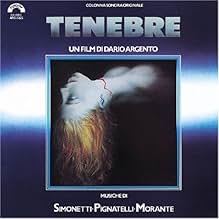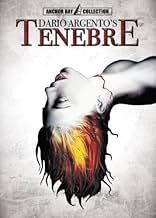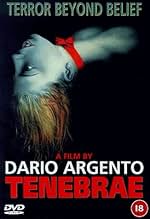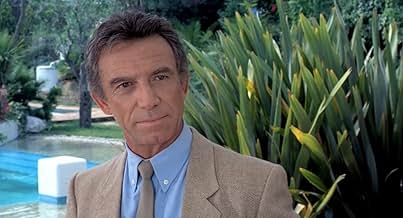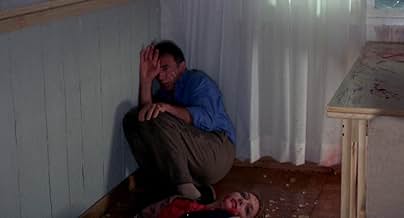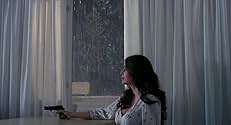An American novelist visiting Rome to promote his latest book is stalked and harassed by an obsessed fan who is committing a string of murders that appear to be tributes to his work.An American novelist visiting Rome to promote his latest book is stalked and harassed by an obsessed fan who is committing a string of murders that appear to be tributes to his work.An American novelist visiting Rome to promote his latest book is stalked and harassed by an obsessed fan who is committing a string of murders that appear to be tributes to his work.
Ennio Girolami
- Department Store Manager
- (as Enio Girolami)
Featured reviews
Perhaps one of the top mystery-thrillers of the 1980s; if you like films like "The 4th Man" (1983) or "Body Double" (1984), you'll fancy this one too. Well-constructed twisty-turny plot, virtuoso camerawork, sudden shocks, terrific synthesizer score, supremely good-looking female cast. It's also surprisingly self-reflexive: the character of the writer can be seen as a stand-in for Argento himself, who uses him as a means of addressing some of the most common criticisms made against his films. This is peak Argento. *** out of 4.
I first saw Tenebr(a)e under the moniker "Unsane" (which is supposedly missing ten minutes of gore and some extensive camera-work). I really enjoyed the film, so I bought the rerelease print from Anchor Bay, and I must say, the restored, uncut, letterboxed print looks and sounds wonderful.
There's no need to go into the plot other than to say Anthony Franciosa stars as American horror novelist Peter Neal and, while he's in Rome on a book tour, murders are being committed by one of his crazed fans. I read somewhere that Argento is king of stringing together a plot and cheating audiences just so they can't guess the identity of the killer, and with this as evidence, I agree 100%. It's nearly impossible to figure out this plot before it's fully explained.
Luciano Tovoli's camera-work/cinematography is brilliant, especially the luma crane shot (which goes up one side of a building, over the roof and down the other side in one unbroken taken). There's also an extremely well-photographed and directed sequence featuring a girl being pursued by a rabid Doberman. Now they would do those two scenes with computers, and I think that obliterates the charm of the hands-on film-making process.
In short, this film puts Hollywood thrillers like "Copycat" "The Bone Collector," and "Se7en" to shame, and it's apparent all three films stole ideas from this one (and from other films in Argento's oeuvre).
There's no need to go into the plot other than to say Anthony Franciosa stars as American horror novelist Peter Neal and, while he's in Rome on a book tour, murders are being committed by one of his crazed fans. I read somewhere that Argento is king of stringing together a plot and cheating audiences just so they can't guess the identity of the killer, and with this as evidence, I agree 100%. It's nearly impossible to figure out this plot before it's fully explained.
Luciano Tovoli's camera-work/cinematography is brilliant, especially the luma crane shot (which goes up one side of a building, over the roof and down the other side in one unbroken taken). There's also an extremely well-photographed and directed sequence featuring a girl being pursued by a rabid Doberman. Now they would do those two scenes with computers, and I think that obliterates the charm of the hands-on film-making process.
In short, this film puts Hollywood thrillers like "Copycat" "The Bone Collector," and "Se7en" to shame, and it's apparent all three films stole ideas from this one (and from other films in Argento's oeuvre).
This is a stylish, sprawling giallo from Director Dario Argento. Writer Peter Neale is played by 50-something Anthony Franciosa, surrounded by a cheery, adoring gaggle of young ladies whenever he flashes his pearly whites. Unlike a lot of giallo leading men, however, Neale is likeable and a gentleman, at least most of the time, and Franciosca plays him very well. Some nicely paced set-pieces put the victims through their paces in a memorably punishing manner, often topped off with more than a splash of thick red blood.
Supporting players include the appealing Christian Borromeo as possible suspect Gianni, and the familiar face of John Saxon, who was prolific in film and television at this time, is Bullmer.
The star of the show though, is undoubtedly Argento's wondrous directorial flourishes. The squealing, electronic prog-rock soundtrack is provided by the idiosyncratic band Goblin. Like their other incidental scores it is somewhat 'full on' at times, but nevertheless injects various scenes with a sense of perverse dread, and enters fully into the director's somewhat gaudy style.
'Tenebrae' saw the welcome return of Argento to the world of giallo after delving into pure supernatural horror for his last few ventures. It proved he hadn't lost his stylish approach to the genre and remains a favourite of mine. The ending, where there is revelation upon revelation, is particularly successful. If you are considering venturing into the world of 'Tenebrae' for the first time, I advise you to avoid spoilers! My score for this is 8 out of 10.
Supporting players include the appealing Christian Borromeo as possible suspect Gianni, and the familiar face of John Saxon, who was prolific in film and television at this time, is Bullmer.
The star of the show though, is undoubtedly Argento's wondrous directorial flourishes. The squealing, electronic prog-rock soundtrack is provided by the idiosyncratic band Goblin. Like their other incidental scores it is somewhat 'full on' at times, but nevertheless injects various scenes with a sense of perverse dread, and enters fully into the director's somewhat gaudy style.
'Tenebrae' saw the welcome return of Argento to the world of giallo after delving into pure supernatural horror for his last few ventures. It proved he hadn't lost his stylish approach to the genre and remains a favourite of mine. The ending, where there is revelation upon revelation, is particularly successful. If you are considering venturing into the world of 'Tenebrae' for the first time, I advise you to avoid spoilers! My score for this is 8 out of 10.
Thrilling and shocking Giallo by the talented writer/director Dario Argento . Exciting film with effective aesthetic that has lots of gore , guts , chilling assassinations and twists plots . An American crime writer named Peter Neal (Anthony Franciosa) arrives in Rome to promote a new novel , which triggers a killing spree in the manner described in his book , including savage cutting . As Detective Giermani (Giuliano Gemma) in charge of the investigation, along with a detective female partner . Peter Neal is unaware that he is also being followed by his embittered ex-wife Jane (Veronica Lario) and stalked by a serial killer bent on harassing him while killing all people associated with his work on his latest novel.
This is a Shocker/Chopper/Slasher/Horror/Thriller hybrid . Italian cult director Dario Argento , master of arty gore , brings this scary and stylish story plagued with depraved gore murders . This intriguing film packs chills , suspense , thrills , bloody murders and plot twists ; however it contains some gaps in the flick big enough to sink credibility . Interesting screenplay plenty of twists and turns by the master of horror , Dario Argento , who double-crosses and cheats like mad to conceal the murderous's identity and including imaginatively staged gory killings ; resulting to be one of his most successful movies . This is a trademark terror work for the Horrormeister Argento with high tension quotient and equally elevated suspense by means of an ever-fluid camera that achieves colorful shots well photographed . ¨Tenebre¨ is an acceptable and passable entertainment with surprising and intriguing situations , it does have some good and eerie moments . Ample support cast formed by usual in Italian Terror such as Ana Pieroni , Lara Wendel , Christian Borromeo ,John Saxon , John Steiner and Daria Nicolidi , Argento's wife . Furthermore , a colorful cinematography in deep red by Luciano Tovoli , Argento's usual and a creepy musical score composed by means synthesizer .
Dario Argento is one of those film-makers who set off simple for frightening us to death . His period of biggest hits were the 70s when he directed the animals trilogy : ¨Four flies over gray velvet¨, ¨The cat of nine tails¨, ¨Bird with the crystal plumage¨, after he directed some masterpieces as ¨Suspiria¨ (1977), a surreal horror film about a witch's coven that was inspired by the Gothic fairy tales of the Grimm Brothers and Hans Christian Anderson, which he also wrote in collaboration with his girlfriend, screenwriter/actress Daria Nicolodi, who acted in "Profondo Rosso" ("Deep Red") and most of Argento's films from then to the late 1980s . Argento advanced the unfinished trilogy with Inferno (1980), before returning to the "giallo" genre with the gory Tenebre (1982), and then with the haunting ¨Phenomena¨ (1985) , one of the best ¨Giallo , all of them confirm Argento's dedication to the technicalities of constructing frames in Grand Guignol style . In 1995 Argento made a comeback to the horror genre with ¨La Sindrome Di Stendhal (1996)¨ and then by another version of ¨The phantom of the Opera¨ (1998) both of which starred by his daughter Asia Argento . Most recently, Argento directed a number of 'giallo' mystery thrillers which include Insomnio (2001), ¨Il Cartaio (2004)¨, and ¨Ti Piace Hitchcock?¨ (2005), as well as two creepy , supernatural-themed episodes of the USA TV cable anthology series "Masters of Horror". Furthermore , to his Gothic and violent style of storytelling , ¨La Terza Madre (2007)¨ has a lot of references to the previous two movies as 'Suspiria' and 'Inferno' which is a must for fans of the trilogy . And finally directed a so-so film called ¨Giallo¨ and recently ¨Dracula 3D¨ .
This is a Shocker/Chopper/Slasher/Horror/Thriller hybrid . Italian cult director Dario Argento , master of arty gore , brings this scary and stylish story plagued with depraved gore murders . This intriguing film packs chills , suspense , thrills , bloody murders and plot twists ; however it contains some gaps in the flick big enough to sink credibility . Interesting screenplay plenty of twists and turns by the master of horror , Dario Argento , who double-crosses and cheats like mad to conceal the murderous's identity and including imaginatively staged gory killings ; resulting to be one of his most successful movies . This is a trademark terror work for the Horrormeister Argento with high tension quotient and equally elevated suspense by means of an ever-fluid camera that achieves colorful shots well photographed . ¨Tenebre¨ is an acceptable and passable entertainment with surprising and intriguing situations , it does have some good and eerie moments . Ample support cast formed by usual in Italian Terror such as Ana Pieroni , Lara Wendel , Christian Borromeo ,John Saxon , John Steiner and Daria Nicolidi , Argento's wife . Furthermore , a colorful cinematography in deep red by Luciano Tovoli , Argento's usual and a creepy musical score composed by means synthesizer .
Dario Argento is one of those film-makers who set off simple for frightening us to death . His period of biggest hits were the 70s when he directed the animals trilogy : ¨Four flies over gray velvet¨, ¨The cat of nine tails¨, ¨Bird with the crystal plumage¨, after he directed some masterpieces as ¨Suspiria¨ (1977), a surreal horror film about a witch's coven that was inspired by the Gothic fairy tales of the Grimm Brothers and Hans Christian Anderson, which he also wrote in collaboration with his girlfriend, screenwriter/actress Daria Nicolodi, who acted in "Profondo Rosso" ("Deep Red") and most of Argento's films from then to the late 1980s . Argento advanced the unfinished trilogy with Inferno (1980), before returning to the "giallo" genre with the gory Tenebre (1982), and then with the haunting ¨Phenomena¨ (1985) , one of the best ¨Giallo , all of them confirm Argento's dedication to the technicalities of constructing frames in Grand Guignol style . In 1995 Argento made a comeback to the horror genre with ¨La Sindrome Di Stendhal (1996)¨ and then by another version of ¨The phantom of the Opera¨ (1998) both of which starred by his daughter Asia Argento . Most recently, Argento directed a number of 'giallo' mystery thrillers which include Insomnio (2001), ¨Il Cartaio (2004)¨, and ¨Ti Piace Hitchcock?¨ (2005), as well as two creepy , supernatural-themed episodes of the USA TV cable anthology series "Masters of Horror". Furthermore , to his Gothic and violent style of storytelling , ¨La Terza Madre (2007)¨ has a lot of references to the previous two movies as 'Suspiria' and 'Inferno' which is a must for fans of the trilogy . And finally directed a so-so film called ¨Giallo¨ and recently ¨Dracula 3D¨ .
The successful American writer from Rhode Island Peter Neil (Anthony Franciosa) travels from New York to Rome to promote his new best-seller Tenebre. He is received by his agent Bullmer (John Saxon) that schedules an interview in a talk show. As soon as Peter arrives, there is the murder of a shoplifter and Detective Germani (Giuliano Gemma) is assigned to the case. He meets Peter and tells that the killer was inspired by his novel to commit the crime. Peter receives a letter from the murderer and soon two lesbians are murdered. The killer writes that perverts must be eliminated and Peter suspects of the host of his show. However, when you eliminate the impossible, whatever remains might be the truth.
"Tenebre" is one of the best "giallos" by Dario Argento. The story is very well constructed and technically speaking, there are long traveling with the camera and magnificent sound effects. The haunting music score from Goblin is also awesome. The VHS released by Anchor Bay in widescreen is spectacular and has extras in the end after the trailer. My vote is seven.
Title (Brazil): Not Available
Note: On 02 March 2017 I saw this film again on DVD. Note: On 07 June 2020 I saw this film again on DVD.
Title (Brazil): "Tenebre"
"Tenebre" is one of the best "giallos" by Dario Argento. The story is very well constructed and technically speaking, there are long traveling with the camera and magnificent sound effects. The haunting music score from Goblin is also awesome. The VHS released by Anchor Bay in widescreen is spectacular and has extras in the end after the trailer. My vote is seven.
Title (Brazil): Not Available
Note: On 02 March 2017 I saw this film again on DVD. Note: On 07 June 2020 I saw this film again on DVD.
Title (Brazil): "Tenebre"
Did you know
- TriviaThe impressive two and a half minute crane shot that encircles Tilda's house took three days to be completed. American distributors wanted the shot to be cut from the film for US release, but Argento refused.
- GoofsOn the telephone, the killer tells Peter Neal that "you wrote those words, page 46," but in fact the words quoted would have had to be on an odd-numbered page of the book TENEBRAE, given the placement of the text we see in the opening sequence.
- Quotes
Peter Neal: Let me ask you something? If someone is killed with a Smith & Wesson revolver... Do you go and interview the president of Smith & Wesson?
- Crazy creditsAnne's screams continue even as the ending credits roll.
- Alternate versionsThe U.S. Mill Creek Entertainment DVD release under the title "Unsane" is listed as the 110 minute version. However, the version on the disc is pan-and-scanned, heavily edited and runs a little over 90 minutes.
- ConnectionsFeatured in O erotas tou Odyssea (1984)
- SoundtracksTake Me Tonight
Performed by Kim Wilde
Details
- Release date
- Country of origin
- Languages
- Also known as
- Tenebrae (el placer del miedo)
- Filming locations
- Viale Perù, 40 00060 Le Rughe RM, Formello, Rome, Lazio, Italy(Christiano Berti's house)
- Production company
- See more company credits at IMDbPro
Box office
- Gross worldwide
- $2,301
- Runtime1 hour 41 minutes
- Sound mix
- Aspect ratio
- 1.85 : 1
Contribute to this page
Suggest an edit or add missing content



